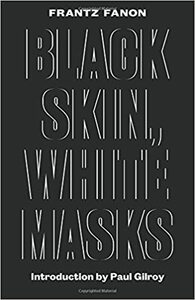Take a photo of a barcode or cover
So this book was originally published in the 1950s, by a Black man living in Martinique. I originally started reading the audio over summer because it was one of the books Matt suggested, but I got about an hour in and just ... couldn't really get into it. And my hold lapsed. And then it kept lapsing, but I decided to finally finish it, mostly to say I did. I listened to most of it on 2x speed, and to say this book is not for me in an understatement.
I know I don't like most non-fiction to begin with, but I think in this particular case the gap of time period and language was really disconnecting. So many truths of the time have since been disproven, to the point where a lot of this reads like BS men make up on the internet to justify hatred. Ideally it's something where we can read it as a piece of its time, and most other reviews point out that this was a foundational text for the modern experience of Black men, especially in a post-slavery world, that is also grappling with two World Wars. One reviewer pointed out that this book perhaps became bigger than it was intended to be - it lives between a scientific text and a memoir, which is a style we are very familiar with today, but here just reads like your grandpa having grown up in a different time.
I can't really offer much specific critique - I'm not the audience, and frankly I probably didn't give the book the attention it deserves.
I know I don't like most non-fiction to begin with, but I think in this particular case the gap of time period and language was really disconnecting. So many truths of the time have since been disproven, to the point where a lot of this reads like BS men make up on the internet to justify hatred. Ideally it's something where we can read it as a piece of its time, and most other reviews point out that this was a foundational text for the modern experience of Black men, especially in a post-slavery world, that is also grappling with two World Wars. One reviewer pointed out that this book perhaps became bigger than it was intended to be - it lives between a scientific text and a memoir, which is a style we are very familiar with today, but here just reads like your grandpa having grown up in a different time.
I can't really offer much specific critique - I'm not the audience, and frankly I probably didn't give the book the attention it deserves.
challenging
emotional
hopeful
informative
inspiring
reflective
medium-paced
challenging
informative
reflective
slow-paced
informative
reflective
slow-paced
Fanon est une figure incontournable quand on aborde l'antiracisme et les mouvements décoloniaux. C'est donc avec beaucoup d'enthousiasme que j'ai plongé dans cet essai. D'emblée, je l'ai trouvé difficile d'accès (dans la prose et dans certaines réflexions qui ont mille couches de lectures, notamment dans la partie psychanalyse, mais c'est aussi mon petit bagage en psychanalyse qui parle). J'y ai retrouvé les prémices fondateurs de la pensée décoloniale actuelle, cela a fait grandement écho avec l'essai ''La charge raciale, Vertige d'un silence écrasant'' de Douce Dibondo, la façon dont ça plonge dans la psychée des personnes noires.
Comme l'auteur l'a précisé, c'est un essai qui s'inscrit dans son contexte historique et culturelle, où il ne traite que de la communauté Antillaise dont il est issu (cela m'a vraiment donné envie d'en lire plus). J'ai d'ailleurs trouvé intéressant de lire des analogies avec la question juive dans le contexte post-2GM.
De plus, la pensée de Fanon est malheureusement teintée de misogynie et d'homophobie. C'est un male gaze assez fort qu'on retrouve à travers les pages, notamment dans le chapitre sur la Femme Noire et l'Homme blanc, où Fanon a parlé de la femme noire sans vraiment parler de l'expérience vécue des femmes noires. Après tout, Frantz Fanon était un homme noir. But still, j'ai désormais envie de me tourner vers des autrices noires afroféministes.
Comme l'auteur l'a précisé, c'est un essai qui s'inscrit dans son contexte historique et culturelle, où il ne traite que de la communauté Antillaise dont il est issu (cela m'a vraiment donné envie d'en lire plus). J'ai d'ailleurs trouvé intéressant de lire des analogies avec la question juive dans le contexte post-2GM.
De plus, la pensée de Fanon est malheureusement teintée de misogynie et d'homophobie. C'est un male gaze assez fort qu'on retrouve à travers les pages, notamment dans le chapitre sur la Femme Noire et l'Homme blanc, où Fanon a parlé de la femme noire sans vraiment parler de l'expérience vécue des femmes noires. Après tout, Frantz Fanon était un homme noir. But still, j'ai désormais envie de me tourner vers des autrices noires afroféministes.
challenging
dark
emotional
reflective
tense
fast-paced
challenging
inspiring
tense
medium-paced
challenging
informative
slow-paced
The book helps unveiling some aspects of the psychological consequences colonization and racism has on Black people.
Fanon delves into how language, culture, and societal structures contribute to creating this "mask" where Black people feel the need to conform to be accepted.
However, his analysis of gender and relationships, particularly regarding Black women are concerning and clearly shows his bias and male-centered psychoanalysis.
Fanon delves into how language, culture, and societal structures contribute to creating this "mask" where Black people feel the need to conform to be accepted.
However, his analysis of gender and relationships, particularly regarding Black women are concerning and clearly shows his bias and male-centered psychoanalysis.
challenging
informative
reflective
medium-paced
challenging
informative
reflective
slow-paced
I think this book had some good information and insights but I also think it was pretty misogynistic. I also think audiobook was not the format for this as I found my mind wandering. Fanon does touch a lot on how it feels to be black in the world which I think is important.
challenging
informative
reflective
medium-paced






